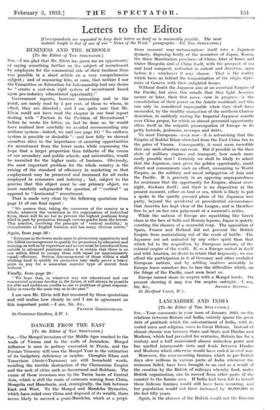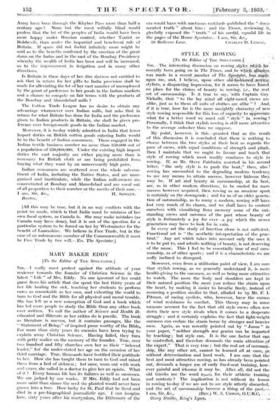LANCASHIRE AND INDIA
[To the Editor of THE SPECTATOR.]
Sim—Your comments in your issue of January 20th, on the relations between Britain and India, entirely ignore the great debt of gratitude which the sub-continent of India, with its varied races and religions, owes to Great Britain.. Instead of almost chronic war between State and State and Hindus and Moslems, which had prevailed for centuries, Britain has for a century and a half maintained almost unbroken peace and has quelled innumerable riots and feuds between Hindus and Moslems which otherwise would have ended in civil mar.
Moreover, the ever-recurring famines which in pre-British days slew millions in various parts of India whenever the monsoon failed, have been brought to an end as a result of the creation by the British of railways whereby food, under British organization, can be moved from other parts of the country to the famine area. If India had been left to herself those hideous famines would still have been recurring, and her population would not have increased by 40,000,000 in the last fifty years.
Again, in the absence of the British would not the Russian Army have been through the Khyber pass snore. than Italt a century ago ? None but the most wilfully blind would profess that the lot of the peoples of India would fiave been more happy under RusSian control; whether Tsarist or Bolshevik, than under the impartial and beneficent rule of
Britain. If space did not forbid infinitely. more might be
. . said as to the benefits conferred by the erection of, the great
darns on the. Indus and in the east of the Bombay Presidency whereby the Weafth of India has been and will.be increased, . as to the improvement in irrigation and in many other
directions. •
Is Britain in these days of her dire distress not entitled to ask that in return for her gifts ,to India provision shall be made foralleyiating the lot of her vast number of unemployed by the grant of preference to hei goods in the Indian markets and a chance to compete on fair terms with the products of the Bombay and Alunedubad mills ?
The Cotton Trade League has no desire to obtain any advantage whatsoever over Indian mills, but asks that in return for what Britain has done for India and the preference given to Indian products in Britain, she shall be given pre- femme over foreign-made goods in the Indian market.
Moreover, it is to-day widely adMitted in India that lower import duties on British cotton goods entering India would be to the benefit of Indian consumers. Those engaged in the Indian textile business number no more than 350,000 out of a population- of 380,000,000. Under the existing high import duties the vast majority are either paying more than is necessary for British cloth or are being prohibited from buying what they want by an unnecessarily high price.
Indian consumers are scattered over the whole sub-con- tinent of India, including the Native States, and are unor- ganized and inarticulate, while the Indian mitt-Owners are concentrated at Bombay and Ahmedabad and are vocal out of all proportion to their number or the merits of their ease.--
tAll this may be true; but it in no way conflicts with the point we made, which is that India must be mistress of her own fiscal system, as Canada is. She may make mistakes (as Canada may have done), but it is out of the question for a' particular system to be forced on her by Westminster for the benefit of Lancashire. We believe in Free Trade, but in the case of-an autonomous member of the Commonwealth it must lie Free Trade by free wilt —En. The Spectator.]





































 Previous page
Previous page